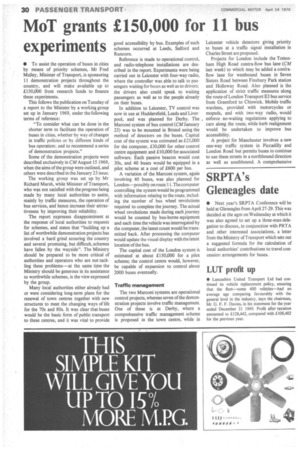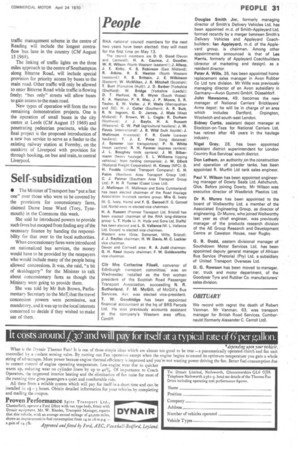MoT grants £150,000 for 11 bus experiments
Page 32

Page 33

If you've noticed an error in this article please click here to report it so we can fix it.
• To assist the operation of buses in cities by means of priority schemes, Mr Fred Mulley, Minister of Transport, is sponsoring 11 demonstration projects throughout the country, and will make available up to £150,000 from research funds to finance these experiments.
This follows the publication on Tuesday of a report to the Minister by a working group set up in January 1969, under the following terms of reference: "To consider what can be done in the • shorter term to facilitate the operation of buses in cities, whether by way of changes in traffic policies or by different kinds of bus operation; and to recommend a series of demonstration projects."
Some of the demonstration projects were described exclusively in CM August 15 1969, when the aims of the group were outlined, and others were described in the January 23 issue.
The working group was set up by Mr Richard Marsh, while Minister of Transport, who was not satisfied with the progress being made by many local authorities to assist, mainly by traffic measures, the operation of bus services, and hence increase their attractiveness by improving their reliability.
The report expresses disappointment at the response of local authorities to requests for schemes, and states that "building up a list of worthwhile demonstration projects has involved a hard grind scouring the country and several promising, but difficult, schemes have fallen by the wayside". The Ministry should be prepared to be more critical of authorities and operators who are not tackling these problems—at the same time the Ministry should be generous in its assistance to worthwhile schemes, is the view expressed by the group.
Many local authorities either already had or were considering long-term plans for the renewal of town centres together with new structures to meet the changing ways of life for the 70s and 80s. It was clear that buses would be the basic form of public transport to these centres, and it was vital to provide good accessibility by bus. Examples of such schemes occurred at Leeds, Salford and Runcorn.
Reference is made to operational control, and radio-telephone installations are described in the report. Experiments were being carried out in Leicester with four-way radio, where the controller was able to talk to passengers waiting for buses as well as to drivers; the drivers also could speak to waiting passengers as well as to the people already on their buses.
In addition to Leicester, TV control was now in use at Huddersfield, Leeds and Liverpool, and was planned for Derby. The Marconi system of bus control (CM January 23) was to be mounted in Bristol using the method of detectors on the buses. Capital cost of the system was estimated as £25,000 for the computer, £30,000 for other control centre equipment and £10,000 for associated software. Each passive beacon would cost 30s, and 40 buses would be equipped in a pilot scheme at a cost of £600 per bus.
A variation of the Marconi system, again involving 40 buses, was also planned for London—possibly on route 11. The computer controlling the system would be programmed with information relating to the route. including the number of bus wheel revolutions required to complete the journey. The actual wheel revolutions made during each journey would be counted by bus-borne equipment and each time the vehicle was interrogated by the computer, the latest count would be transmitted back. After processing the computer would update the visual display with the latest location of the bus.
The capital cost of the London system is estimated at about £150,000 for a pilot scheme; the control centre would, however, be capable of expansion to control about 2000 buses eventually.
Traffic management The two Marconi systems are operational control projects, whereas seven of the demonstration projects involve traffic management. One of these is at Derby, where a comprehensive traffic management scheme is proposed in the town centre, while in Leicester vehicle detectors giving priority to buses at a traffic signal installation in Charles Street are proposed.
Projects for London include the Tottenham High Road contra-flow bus lane (CM last week) to which may be added a confraflow lane for westbound buses in Seven Sisters Road between Finsbury Park station and Holloway Road. Also planned is the application of strict traffic measures along the route of London Transport E3 bus service from Greenford to Chiswick. Mobile traffic wardens, provided with motorcycles or mopeds, and with two-way radio, would , enforce no-waiting regulations applying to cars along the route, while kerb realignment would be undertaken to improve bus accessibility.
A project for Manchester involves a new one-way traffic system in Piccadilly and London Road but permits buses to continue to use these streets in a northbound direction as well as southbound. A comprehensive
traffic management scheme in the centre of Reading will include the longest contraflow bus lane in the country (CM August 15 1969).
The linking of traffic lights on the three miles approach to the centre of Southampton. along Bitterne Road, will include special provision for priority access by buses to the main road. Other traffic will only be allowed to enter Bitterne Road while traffic is flowing freely; "bus only" streets will allow buses to gain access to the main road.
New types of operation will form the two remaining demonstration projects. One is the operation of small buses in the city centre at Leeds (CM August 15 1969) and penetrating pedestrian precincts, while the final project is the proposed introduction of a new bus service to serve as a feeder to the existing railway station at Formby, on the outskirts of Liverpool with provision for through booking, on bus and train, to central Liverpool.














































































































